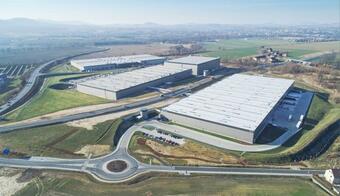The VGP Group has integrated environmental, social and governance objectives into its complete chain, taking into account a wide range of indirect carbon emissions not only from development activities, but also from tenants' energy consumption or their employees' transport to work. "The past months have been another significant step towards a sustainable future. Between 2020 and 2023, we have achieved a cumulative reduction of the carbon footprint from our own operation by 34% per employee and from the point of view of the operated portfolio a reduction of energy intensity per square meter of leased premises by 23%," comments Jan Van Geet, Executive Director of the VGP Group.
VGP continuously improves the ecological efficiency of existing buildings and at the same time builds new sustainable properties, which are realized in the country at least at the BREEAM Very Good level of green certification. Accordingly, it promotes biodiversity and improves natural ecosystems around its projects. Last year, for example, she planted 4,040 new trees, and the total area of habitats created under her watch reached 548,000 square meters.
Accelerated deployment of photovoltaics
The company switched to 100% certified green energy for all of its offices, while significantly accelerating the rollout of photovoltaics at its industrial and logistics parks. Photovoltaic capacity grew by 79.9% year-on-year last year, and operating capacity exceeded 100 MWp to 101.8 MWp (compared to 56.6 MWp in December 2022). 69.0 MWp of photovoltaic projects are under development and another 99.7 MWp are planned. The ongoing transition to green energy consumption in VGP buildings, as well as other environmental measures, contributed to GRESB's developer rating of four stars, the second highest rating among comparable companies operating in the European logistics segment. At the total planned solar power generation capacity, VGP will produce more electricity annually than the consumption of all its tenants combined.
In addition to sustainable energy, the group also pays attention to good transport accessibility (96.4% of all its parks are accessible by public transport) and at the same time develops sustainable mobility. So far, 545 charging stations for electric cars have been installed in VGP campuses, and all new parks are already being built with this in mind.
In terms of social progress, the group achieved an increase in gender diversity when the proportion of women in the group increased by 20 basis points. The VGP Academy was also newly established to provide employees with a platform to share the knowledge and skills needed to support innovation and sustainability within the company. It has an effective ESG governance structure that covers all states and includes ESG-related risks in the risk management system. In addition, VGP is actively interested in philanthropy. The company's employees contributed 1,440 hours of volunteer work last year and the VGP Foundation, whose mission is to help protect nature and support local communities, approved five more projects, bringing the total number of its charitable projects to 41.
The VGP Group operates in seventeen European countries. The family business, based in Antwerp, Belgium, operates a total of 110 parks in Europe. In addition to top technologies, sustainability and energy self-sufficiency are the main criteria for its properties. The company is committed to becoming carbon neutral by 2025, is involved in BREEAM/DGNB certification as well as green energy production.


